九年级英语全册Unit3Teenagersshouldbeallowedtochoosetheirownclothes(第4课时)教案人教新目标版
人教版九年级英语unit3知识点,单词讲解
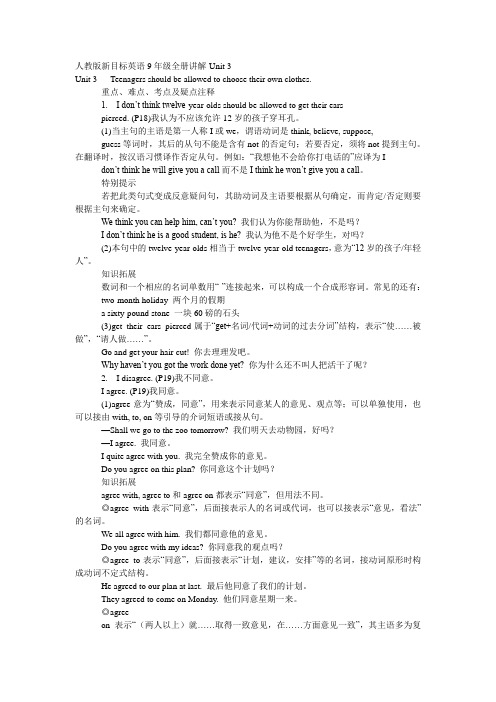
人教版新目标英语9年级全册讲解-Unit 3Unit 3 Teenagers should be allowed to choose their own clothes.重点、难点、考点及疑点注释1. I don’t think twelve-year-olds should be allowed to get their earspierced. (P18)我认为不应该允许12岁的孩子穿耳孔。
(1)当主句的主语是第一人称I或we,谓语动词是think, believe, suppose,guess等词时,其后的从句不能是含有not的否定句;若要否定,须将not提到主句。
在翻译时,按汉语习惯译作否定从句。
例如:“我想他不会给你打电话的”应译为I don’t think he will give you a call而不是I think he won’t give you a call。
特别提示若把此类句式变成反意疑问句,其助动词及主语要根据从句确定,而肯定/否定则要根据主句来确定。
We think you can help him, can’t you? 我们认为你能帮助他,不是吗?I don’t think he is a good student, is he? 我认为他不是个好学生,对吗?(2)本句中的twelve-year-olds相当于twelve-year-old teenagers,意为“12岁的孩子/年轻人”。
知识拓展数词和一个相应的名词单数用“-”连接起来,可以构成一个合成形容词。
常见的还有:two-month holiday 两个月的假期a sixty-pound stone 一块60磅的石头(3)get their ears pierced属于“get+名词/代词+动词的过去分词”结构,表示“使……被做”,“请人做……”。
Go and get your hair cut! 你去理理发吧。
九年级上册单词巧记 句型语法剖析(Unit 3 Teenagers should be allowed to c
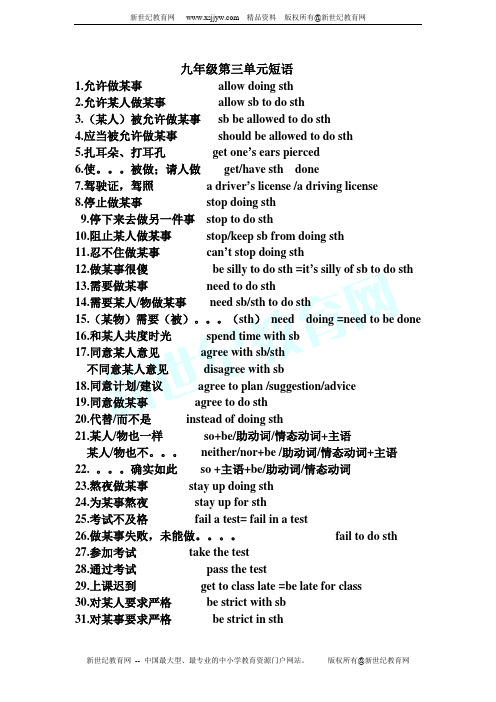
九年级第三单元短语1.允许做某事allow doing sth2.允许某人做某事allow sb to do sth3.(某人)被允许做某事sb be allowed to do sth4.应当被允许做某事should be allowed to do sth5.扎耳朵、打耳孔get one’s ears pierced6.使。
被做;请人做get/have sth done7.驾驶证,驾照 a driver’s license /a driving license8.停止做某事stop doing sth9.停下来去做另一件事stop to do sth10.阻止某人做某事stop/keep sb from doing sth11.忍不住做某事can’t stop doing sth12.做某事很傻be silly to do sth =it’s silly of sb to do sth13.需要做某事need to do sth14.需要某人/物做某事need sb/sth to do sth15.(某物)需要(被)。
(sth)need doing =need to be done16.和某人共度时光spend time with sb17.同意某人意见agree with sb/sth不同意某人意见disagree with sb18.同意计划/建议agree to plan /suggestion/advice19.同意做某事agree to do sth20.代替/而不是instead of doing sth21.某人/物也一样so+be/助动词/情态动词+主语某人/物也不。
neither/nor+be /助动词/情态动词+主语22. 。
确实如此so +主语+be/助动词/情态动词23.熬夜做某事stay up doing sth24.为某事熬夜stay up for sth25.考试不及格fail a test= fail in a test26.做某事失败,未能做。
Unit_3_Teenagers_should_be_allowed_to_choose_their_own_clothes
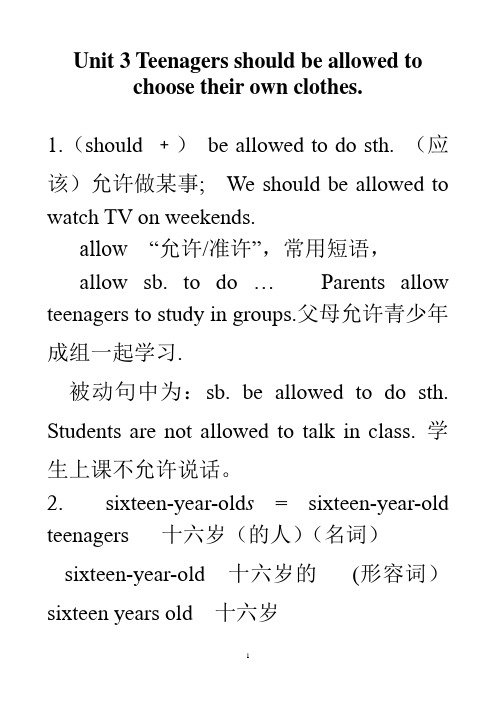
Unit 3 Teenagers should be allowed tochoose their own clothes.1.(should ﹢)be allowed to do sth. (应该)允许做某事; We should be allowed to watch TV on weekends.allow “允许/准许”,常用短语,allow sb. to do …Parents allow teenagers to study in groups.父母允许青少年成组一起学习.被动句中为:sb. be allowed to do sth. Students are not allowed to talk in class. 学生上课不允许说话。
2. sixteen-year-old s= sixteen-year-old teenagers 十六岁(的人)(名词)sixteen-year-old十六岁的(形容词)sixteen years old 十六岁The boy is five years old. = He is a five-year-old boy.3.o wn pron. & adj. 自己的I have my own bedroom.v. 拥有,占有This book is mine. I own it.owner n. 物主,主人Who is the owner of the house.4.(足)够…… enough +名词enough people/water/time/money形容词/副词+enough big/tall/serious enough5. stop to do…停下来去干……He stops to have a rest.stop doing… 停止(不准)干……Please stop talking.stop sb. from doing sth. 阻止某人做某事5. He doesn‟t seem to have many friends.= It seems that he doesn‟t have manyfriends. 他看起来没有很多朋友.6. He needs time to do homework. 他需要时间做作业. need (sth.) to do sth. They need money to buy food.need sth. We all need air and water.sth.doing sth. The bike needs repairing. = The bike needs to be repaired. (主动表被动)7. They talk instead of doing homework. = They don‟t do homework. They talk. 他们谈话,没有做作业.instead of +名词/代词They go to the movies instead of their parents.+动名词(doing) He sang a song instead of telling a story.8. a lot of =lots of 许(很)多/大量的(可/不可数名词)many(可数名词)much (不可数名词)9. So do we. 我们家也是(有). He runs so fast. So does his brother.1) 用副词too 多用于口语,句末, 肯定句/问句.either多用于口语,句末, 否定句表“……也一样”also 多用正式文体, 句中近动词, 各句型.2)用倒装陈述部分肯定用“so+谓动+ 主语”陈述部分否定用“nor/neither+谓动+主语”注意:so+主语+助动词/情态动词/系动词be”,表示赞同某人的看法,意为“是啊,确实如此”--- Lily sings well. --- So she does. ---Lily唱得好。
九年级英语全册《Unit 3 Teenagers should be allowed to choo
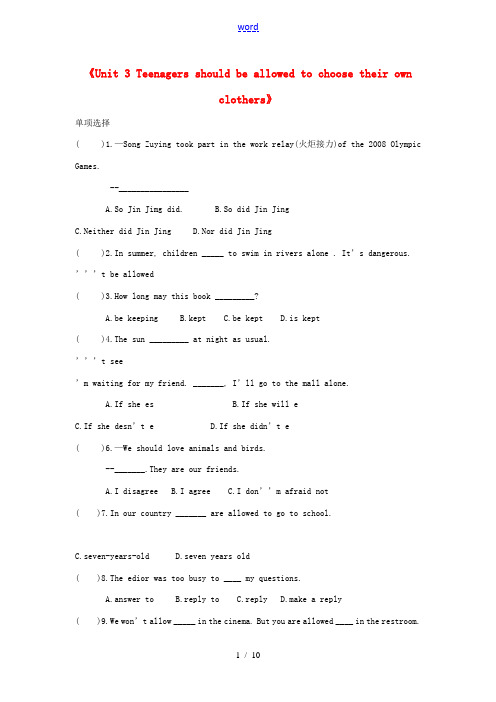
《Unit 3 Teenagers should be allowed to choose their ownclothers》单项选择( )1.—Song Zuying took part in the work relay(火炬接力)of the 2008 Olympic Games.--________________A.So Jin Jimg did.B.So did Jin JingC.Neither did Jin JingD.Nor did Jin Jing( )2.In summer, children _____ to swim in rivers alone . It’s dangerous. ’’’t be allowed( )3.How long may this book _________?A.be keepingB.keptC.be keptD.is kept( )4.The sun _________ at night as usual.’’’t see’m waiting for my friend. _______, I’ll go to the mall alone.A.If she esB.If she will eC.If she desn’t eD.If she didn’t e( )6.—We should love animals and birds.--_______.They are our friends.A.I disagreeB.I agreeC.I don’’m afraid not( )7.In our country _______ are allowed to go to school.C.seven-years-oldD.seven years old( )8.The edior was too busy to ____ my questions.A.answer toB.reply toC.replyD.make a reply( )9.We won’t allow _____ in the cinema. But you are allowed ____ in the restroom.A.smoke; smokingB.to smoke ; to smokeC.smoking; to smokeD.to smoke; smoking’t _____ too late, or you’ll feel tired in tomorrow’s classes.A.wake upB.stay upC.get upD.give up( )11.—I used to go out for a walk after supper.--_______________.A.So do IB.So did IC.So can ID.So am I.( )12.—What should we do first if we want to develop our village ?--A lot of new roads_____, I think.A.have to buildB.must buildC.must be builtD.have built( )13.I must get my breakfast ______ now.’t worry . He is _____ to look after little Betty.A.carefully enoughB.enough carefulC.careful enoughD.enough carefully( )15.What did you use to do ______ my age ?A.atB.inC.withD.to二.完形填空After the Second World War, there were many reports of mysterious(神秘的)“flying saucers(碟子)”.They 1 throughout the world.For quite a long time strange shapes had been reported in 2 parts of the world,but it was not until recent times that these were seriously studied . Pictures and films 3 of flying saucers, or UFOs seen in the sky . Some pilots of 4 reported that round flying machines had flollowd 5 , and moved at great speeds. Some unofficial (非官方的)experts and 6 suggested that some creatures(生物)from other planets were watching us. Some reports said a UFO had 7 the earth. A space creature 8 the UFO and moved around , then flew of again. But none of the landings was ever proved(被证实) to be true.What lies ahead of us (我们的前景如何)?We do not know. 9 we can be sure that whatever happens, we are living in an age which will grow streadily(稳定地) 10 .( )3.A.take B.took C.were taking D.were taken( )4.A.planes( )7.A.was B.left C.arrived nded on( )9.A.And B.But C.Or D.So( )10.A.interesting B.interested C.more interesting D.more interested 三.阅读理解A:Who Influences Teenagers?“Teenager” means people from 13 to 19 years old. Although they’re young, they have to make many important choices by themselves. They need to think about questions like these.Should I go to college ? What kind of jobs do I want ? However, other people also influence their choices . Who influences Teenagers ? Teenagers were asked this question and here’s what they said.It depends on the kind of choice . When teenagers buy things , friends are the most important influence. This is especially true for clothes and music. TV shows, advertiserments(广告)and parents also influence teenagers. In more serious things, parents are probably the most important influence. Some teenagers say it’s best to regard both parents and friends as influences. James, a seventeen-year-old boy says he’s “Just a crazy man”. He also says , “Parents are really important because they can tell you what’s right and wrong.”But teenagers also feel they need to make choices to make their own mistakes.As one teenage girl said, “If our parents don’t let us make our own choices, maybe in the future we won’t know how to do it .” And they feel friends can often be a big help, especially because friends sometimes know more about their situation(处境)than their parents do.Do you depend parents or others when you decide what to do and how to do it ? whoever(无论谁)you depend on ,the correct choice is the most important. Your future is in your hand.根据短文内容,判断正(T)误(F)( )1.When teenagers buy clothes and music, friends are the most important influence.( )2.People from 13 to 19 can be called “teenagers”.( ) shows and advertisements can’t influence teenagers.( )4.Sometimes friends know more about teenagers’situation than their parents.( )5.In more serious things , friends are probably the most important influence. BA DiscussionHost: Hello! I’m Gavin from All Talk 970FM.Wele to our program. Today our topic is part-time jobs. Are they good for school children or not?Headmaster(校长):Certainly not. Children have got two full-time jobs already: growing up and going to school. Part-time jobs make them so tired that they fall asleep in class.Mrs Smith: I agree. I know school hours are short, but there’s homework too. And children need a lot of stay at school until they’re eighteen or nineteen. A part-time job can’t harm(伤害)them. In fact, it’s good for them. They themselves make their pocket money . And they see something of the world outside school.Business man:You’re quite right. Boys learn a lot from a part-time job.And wemustn’t forget that some families need the extra(额外的)money. If the students don’t take part-time jobs , they can’t stay at school.Host: Well, we have got two for , and two agaist . What do our listeners think ? ( )1.How many guests join the discussion ?( )2.Who have the same idea ?A.Mr and Mrs Smith .B.The host and Mrs Smith.C.the headmaster and businessmanD.The businessman and Mr Smith( )3.Mrs Smith thinks that children ________.A.need enough sleepB.need the extra moneyC.should see something of the World outside schoolD.should stay at school until they’re eighteen or nineteen( )4.What do the children think of part-time jobs ?A.We are not told in this passageB.Part-time jobs are good for themC.Part-time jobs aren’t good for their studies.D.Part-time jobs can help the students from poor families.( )5.Where is the discussion most probably from ?A.A TV stationB.A radio stationC.A newspaperD.A magazzine.CStrong Man Swimming Club Rules1.All swimmers must take a shower before they go into the pool.2.Diving is only allowed from the diving-board.3.Running and playing near the pool is not allowed.4.Club members may bring guests at the weekends only.5.Children under 12 are not allowed to use the pool unless they are with an adult.6.Members must show their membership cards at the front reception desk.ed towels must be placed in the bins provided.8.Smoking is not allowed in the changing-room.9.Guests must sign at the front reception desk.10.Only club members and their families are allowed to use the pool.( )1.Diving is allowed from _____A.everywhereB.right side of the poolC.the diving-boardD.the gate ( )2.When are guests allowed to e ?A.FridayB.SaturdayC.Any dayD.After 6:00 pm.( )3.What must club members bring with them ?A.Towels.B.Keys.C.Swimming caps.D.Membership cards.( )4.If club members bring guests there, what should the guests do ?A.NothingB.Bring ID cardsC.Sing at the front desk( )5.Who are allowed to use the pool?A.AnyoneB.Onlyclub membersC.Only guestsD.Club members and their familiesDIn a classroom in any countries, the teacher teaches more than art or history language. He or she teachers something behind the culture(文化)of the country. In a country such as the United States, people with different histories, cultures and languages join together and they pay much attention to personal ideas. Teachers try to make each student special. Students do not have to remember a lot of information, instead, they work and find answers by themselves. There is often discussion in the classroom.At an early age students learn to have their own ideas. Their education encourages personal thought(思想).The important is placed on how to arrive at an answer and not only to get the correct answer.In most Asian countries, people have the same language, history and culture. Perhaps for this reason, the education there pays more attention to group goals than personal ideas. Children in China and Japan often work together and help each otheron homework. In the classroom, the ways of teaching are often very traditional. The teacher says , and the students listen. There is not much discussion. Instead, the students repeat(重复)rules or information that they have been taught in order to keep than in mind.In many ways there differences e from different educational ideas. In Western countries teachers are taught students to learn by themselves. In some Asian countries, however, teachers often feel that their job is to pass knowledge to students.回答问题1.Do students in the United States have to remember a lot of information ?2.There is often discussion in the classroom in America , isn’t there ?3.What does the education in the United States encourage ?4.Which does the education is some Asian countries pay more attention to , group goals or personal ideas ?5.Put the sentence “In some Asian countries, however, teachers often feel that their job is to pass knowledge to students.”into Chinese.四.词语运用。
九年级上英语 unit 3 Teenagers should be allowed to choose their own clothes.
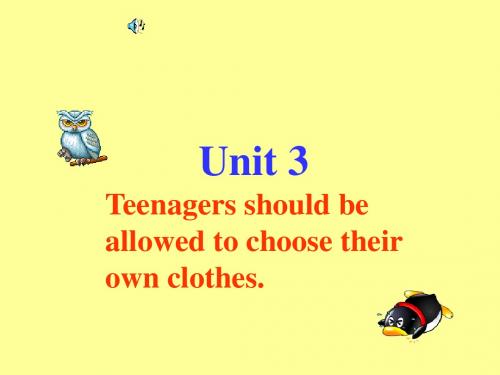
3. Students should not be allowed to go out at night.
4. Students should not be allowed to take part-time jobs .
3. Students should not be allowed to get their ears pierced.
一般现在时: am/is/ are +动词的过去分词 一般过去时: was/were +动词的过去分词
seem 似乎是,好象是 It seems/seemed that +从句 It seems that he is very lonely. He seems to be lonely. It seems that they are friends.
Tony didn’t , either.
neither did Tony.
He wasn’t a doctor , they were not ,either. neither were they.
Tim works hard, so he does. She is a doctor, so she is. He can play the guitar, so she can. So表示强调,主语确实如此。
My sister washed the clothes。 The clothes were washed by my sister. The teacher asked him to the office。 He was asked by the teacher to the office.
My parents allow me to watch TV. I am allowed to watch TV by my parents. He does his homework every day. His homework is done by him every day.
九年级Unit 3 Teenagers should be allowed to choose their own clothes.的语法知识点
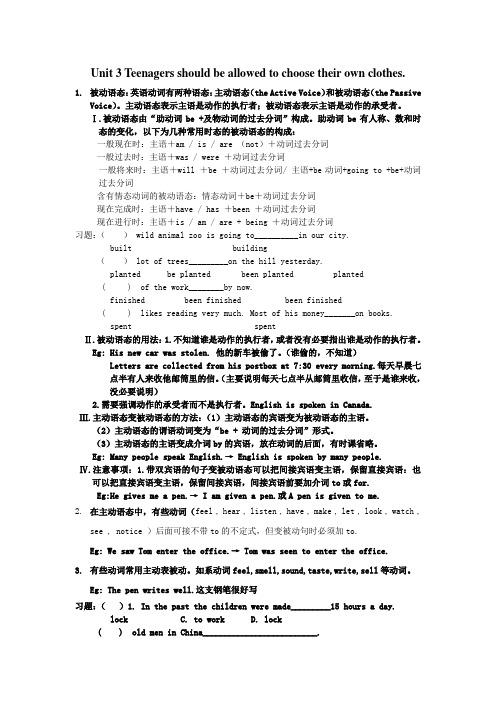
Unit 3 Teenagers should be allowed to choose their own clothes.1.被动语态:英语动词有两种语态:主动语态(the Active Voice)和被动语态(the PassiveVoice)。
主动语态表示主语是动作的执行者;被动语态表示主语是动作的承受者。
Ⅰ.被动语态由“助动词be +及物动词的过去分词”构成。
助动词be有人称、数和时态的变化,以下为几种常用时态的被动语态的构成:一般现在时:主语+am / is / are (not)+动词过去分词一般过去时:主语+was / were +动词过去分词一般将来时:主语+will +be +动词过去分词/ 主语+be动词+going to +be+动词过去分词含有情态动词的被动语态:情态动词+be+动词过去分词现在完成时:主语+have / has +been +动词过去分词现在进行时:主语+is / am / are + being +动词过去分词习题:() wild animal zoo is going to__________in our city.built building() lot of trees_________on the hill yesterday.planted be planted been planted planted( ) of the work________by now.finished been finished been finished( ) likes reading very much. Most of his money_______on books.spent spentⅡ.被动语态的用法:1.不知道谁是动作的执行者,或者没有必要指出谁是动作的执行者。
Eg: His new car was stolen. 他的新车被偷了。
(谁偷的,不知道)Letters are collected from his postbox at 7:30 every morning.每天早晨七点半有人来收他邮筒里的信。
九年级英语 Unit 3 Teenagers should be allowed to choose their own clothes. 讲解与练习

第 1 页 (共4 页) 第 2 页 (共4 页)学校 姓名 班级 考场 考号---------------------------------○密------------------ -------------------○封----------------------------- -- --○线----------------------------※※※※※※※※※※※※※※※答※※※※※※※※※※※※※※※※※※题※※※※※※※※※※※※※※※※线※※※※※※※※※※※※※九年级英语 Unit 3: Teenagers should be allowed tochoose their own clothes. 讲解与练习重点短语take the test 参加考试 pass the test 通过考试 fail a test 考试失败be strict with+人 对某人严格be strict in+事物 对某事要求严格stay up 熬夜have an opportunity to do sth.有机会做某事=have a chance to do/ of doing every other day 每隔一天 (每两天)clean up 打扫 整理learn from each other 互相学习concentrate on 专注于 one’s own 某人自己的the other day 前几天,几天前 = a few days ago= every two days at present 现在,目前 in this way 用这种方法in the way 挡道的,妨碍人的on the way 在路上 on one’s way to 在某人去…的路上 by the way 顺便说(问)be serious about 对…认真care for 在乎、关心 【语言点】1. Teenagers should be allowed to choose their own clothes.应该允许青少年选择自己的衣服。
九年级英语 Unit 3 Teenagers should be allowed to choose theirown clothes
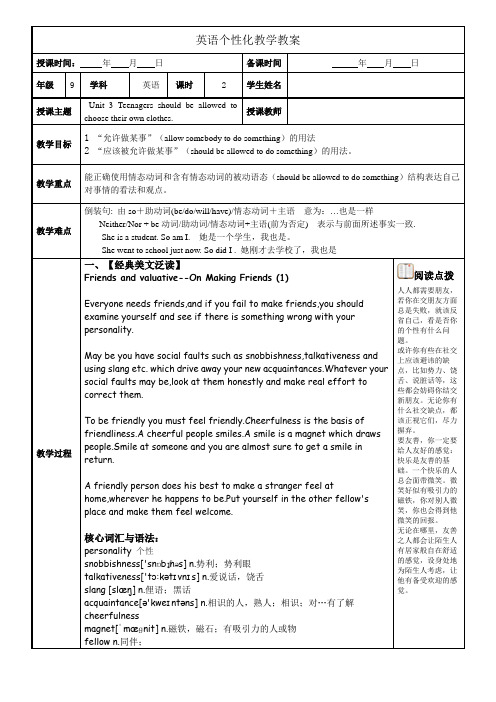
阅读点拨小提示参考答案:Ⅰ.A.1.allowed 2. silly 3. chats 4. volunteer 5. piercedB.1.pay attention to 2. given up 3. stayed up 4. is interested in 5. chats with ]Ⅱ.A.1—5:ACBBB 6—10:CCCBCB:1.be allowed 2. is cleaned 3. was given to 4. spent on 5. will be publishedC:1.get their ears pierced 2. proud of 3. had no opportunity 4.concentrate on 5. are strict withunit3pierce/piəs/v. 刺穿,刺破license/'laisəns/n. 执照;许可证silly/'sili/a. 愚蠢的;傻的earring/'iəriŋ/n. 耳环instead of代替;而不是stay up熬夜;不睡觉concentrate/'kɔnsəntreit/v. 集中;聚集concentrate on专心于;全神贯注study/'stʌdi/v. 学习;研究design/di'zain/n. 设计;构思present/'prezənt]n.目前;现在at present目前,现在opportunity/ɔpə'tju:niti/n. 机会;时机volunteer/vɔlən'tiə/n. 志愿者local/'ləukəl/a. 当地的;地方的experience/ik'spiəriəns/n.v.经历;体验member/'membə/n. 成员;会员mess/mes/n. 混乱;脏乱old people's home养老院sleepy/'sli:pi/a.不活跃的;困倦的reply/ri'plai/v. 回答;答复newsletter/'nju:z,letə/n. 时事通讯;简报obey/ə'bei/v. 服从,顺从in the way妨碍人的;挡道的achiev/ə'tʃi:v/vt.实现;完成race/reis/v.赛跑;比赛n.与...比赛;参加赛跑realistic/riə'listik/a. 现实的;注重实际的taught/tɔ:t/v. 教(teach的过去式和过去分词)importance/im'pɔ:təns/n. 重要性care about关心;担心succeed/sək'si:d/vi. 成功point/pɔint/v. 指,指向。
unit3《teenagersshouldbeallowedtochoosetheirownclothes》教材全析(人教新目标初三)doc初中英语

[教材全析]友情提示SECTION ALanguage Goal:Talk about what you are allowed to do.Agree and disagree.语言目标:谈论你们被承诺做什么。
同意和不同意。
1a Read the statements below.Circle 〝A〞(for agree) or 〝D〞(for disagree).读下面的陈述。
圈出A(表示同意)或D(表示不同意)。
A D 1.I think teenagers①should be allowed to go out with their friends every night.我认为十几岁的青青年应当被承诺每晚同朋友们外出。
A D 2.Sixteen-year-olds should be allowed to drive.十六岁的青青年不应当被承诺驾车。
A D 3.Students should not be allowed to have part-time②job.学生们不可被承诺有兼职的工作。
A D 4.I don’t think twelve-year-olds should be allowed to get their ears pierced.我认为十二岁的青青年不应当被承诺打耳眼。
A D 5.I think twelve-year-olds③should be allowed to choose their own clothes.我认为十二岁的青青年应当被承诺选择自己的衣服。
含有助动词should的句子要变成被动语态,其方法是将主动语态中的宾语提到句首,然后在should后面跟被动语态的差不多结构be+v.过去分词。
将主语加上介词by放在句子末尾。
例题探究:Tom should be allowed to make friends with these teenagers by us.〔变成主动语态〕1b Listen and circle 〝T〞(for true) or 〝F〞(for false).听同时圈出T(对)或F(错)。
第三单元完整版人教版九年级,unit3,单词词汇,课文详解
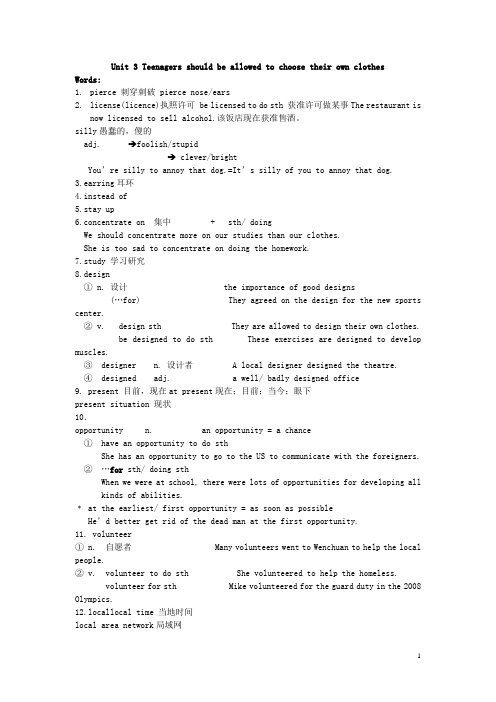
Unit 3 Teenagers should be allowed to choose their own clothes Words:1.pierce 刺穿刺破 pierce nose/ears2.license(licence)执照许可 be licensed to do sth 获准许可做某事The restaurant isnow licensed to sell alcohol.该饭店现在获准售酒。
silly愚蠢的,傻的adj. →foolish/stupid→ clever/brightYou’re silly to annoy that dog.=It’s silly of you to annoy that dog.3.earring耳环4.instead of5.stay up6.concentrate on 集中 + sth/ doingWe should concentrate more on our studies than our clothes.She is too sad to concentrate on doing the homework.7.study 学习研究8.design① n. 设计 the importance of good designs(…for) They agreed on the design for the new sports center.② v. design sth They are allowed to design their own clothes. be designed to do sth These exercises are designed to develop muscles.③ designer n. 设计者 A local designer designed the theatre.④ designed adj. a well/ badly designed office9. present 目前,现在at present现在;目前;当今;眼下present situation 现状10.opportunity n. an opportunity = a chance① have an opportunity to do sthShe has an opportunity to go to the US to communicate with the foreigners.②…for sth/ doing sthWhen we were at school, there were lots of opportunities for developing all kinds of abilities.﹡ at the earliest/ first opportunity = as soon as possibleHe’d better get rid of the dead man at the first opportunity.11. volunteer① n. 自愿者 Many volunteers went to Wenchuan to help the local people.② v. volunteer to do sth She volunteered to help the homeless.volunteer for sth Mike volunteered for the guard duty in the 2008 Olympics.12.locallocal time 当地时间local area network局域网13.experience① n. C/UThis is a bad experience for me.She is a teacher with much experience.She has much experience in teaching.② v. What did you experience in the USA?③ experienced adj. 有经验的He is an experienced teacher.= He is a teacher with much experience.= She has much experience in teaching.14.member 会员成员15. mess① n. 脏,乱What a mess!be in a mess 杂乱无章The kitchen is in a mess.② mess sth up 把…弄脏,弄乱He has messed up his whole life.It doesn’t matter if you mess it up. You can try it again.16.old people’s home养老院sleepy feel sleepy 困倦;昏昏欲睡adj. 欲睡的;困乏的;不活跃的[ 比较级sleepier 最高级sleepiest ]17. reply① v. reply to You must reply to his letter soon.reply that Cindy replied that she would solve it soon.“I’ll solve it soon.” replied Cindy.② n. (to) 回答,答复,回应He didn’t get the reply to the job interview.18.newsletter时事通讯简报19 obeyobey=follow + the rules/laws (make→obey/follow→break the law/ rules)Soldiers are supposed to obey the orders.反义词:disobey20. in the way / in sb’s way 挡道 Can you move that box? It’s in the/ my way.(in) this/that way 用这种/那种方法 Can you work it out in this way? on the way(to) 在路上 On my way to school, I saw an accident.by the way 顺便说一下 By the way, what’s the time?the way to do sth What do you think is the best way to learn English?of doing sth What do you think is the best way of learning English?21. achieve v. 完成, 实现(realize)I hope all of my students can achieve their goals/dreams/success by the endof this term.He has achieved his hope of becoming a doctor.achievement 成就,实现He has a lot of achievements.22. race① n. 比赛 100-metre race relay race 接力赛种族,民族 people of all races② v. 比赛(against) She’ll race against some of the world’s top athletes.23. realistic adj. 现实的;现实主义的;逼真的;实在论的[ 比较级more realistic 最高级most realistic ]24. taught teach 的过去式和过去分词25. importance n. What’s the importance of learning English?→ important adj.be of + n. = be + adj.English is of great importance.= English is very important.类似: help→helpful use→ useful26. care v.It doesn’t matter if it’s new or old. Who cares?care about 担心,在乎 The only thing he cares about is money.care for 照顾;喜欢 I don’t care for his friendsThe children were well cared for.take care of 照顾 The children were taken good care of.take care 保重careful / careless carefully/ carelessly27. succeed→ success→successful→ successfullyI am sure he will succeed as an actor.He achieved his success in the final examination.I don’t think this is a successful meeting.Our school team succeeded in winning the championship.Our school team won the championship successfully.Our school team were successful in winning the championship.Our school team had success in winning the championship.Wish you success28. point①小数点: 5.9 five point nine②要点: There are six points in the meeting.③ v. 指 (… at): He pointed at me and said something.( …to) She shook her head and pointed to a gate.语法:被动语态九年级英语Unit31.语态:①英语有两种语态:主动语态和被动语态主动语态表示是动作的执行者被动语态表示主语是动作的承受者Cats eat fish. (主动语态)猫吃鱼。
九年级英语同步作文unit 3

Unit 3 Teenagers should be allowed to choose their own clothes【单元话题分析】“没有规矩不成方圆”,每所学校、每个家庭都有自己的行为规范准则,该做什么,不该做什么。
本单元的核心话题就是谈论规则,发表自己的见解。
《英语课程标准》在情感态度和文化意识方面要求中学生在学习英语语言的同时,要学会遵守公共行为规范,并培养自身独立思考的能力。
通过对本单元话题的学习,大家一要学会谈论允许做的事和不允许做的事, 深刻了解中学生应该做什么,不应该做什么,建立自己正确的价值观念;二要针对现实生活中的各种行为规范和要求, 发表自己独立的见解。
本话题常见的命题形式主要有两种:一是根据自己的实际情况讲述身边的规则,有时要求谈论个人观点;二是根据内容提示写谈论规则的短文, 这种文体通常是夹叙夹议。
写作本话题常用的结构除了课本上的含有情态动词的被动语态结构should(not) be allowed to之外,have to,must,can’t,should,shouldn’t,you’d better等也很实用,大家应根据需要灵活应用。
【解题技巧】在很多情况下, 本话题的作文常带有议论文的色彩。
因此,在写作时要注意以下几个方面:1.主旨鲜明、论点明确,即要怎么做、做什么,这是谈论规则的基本要求。
因此,要做到具体、简练、开篇名义。
如果有个人见解,可在其后表达。
2.讲述个人观点时,要有论据支持,要讲原因。
说理要结合同学们的实际情况,尽量做到透彻明了。
3.恰当使用时态和语态。
议论文或夹叙夹议的作文会涉及到多种时态,要根据内容选择选择恰当的时态,时态也有一定的感情色彩。
为了使作文内容更加客观公正, 常常会用到被动语态;为了使作文给人以亲切的感觉, 常以第一人称的口吻写作,这时常用主动语态。
写作时应根据需要确定使用哪种语态。
4.结构清楚。
议论文常见的结构是,先摆论点,在进行论证,最后得出结论。
【全效学习】九年级英语全册 Unit 3 Teenagers should be allowed to choose their own clothes(第一课时
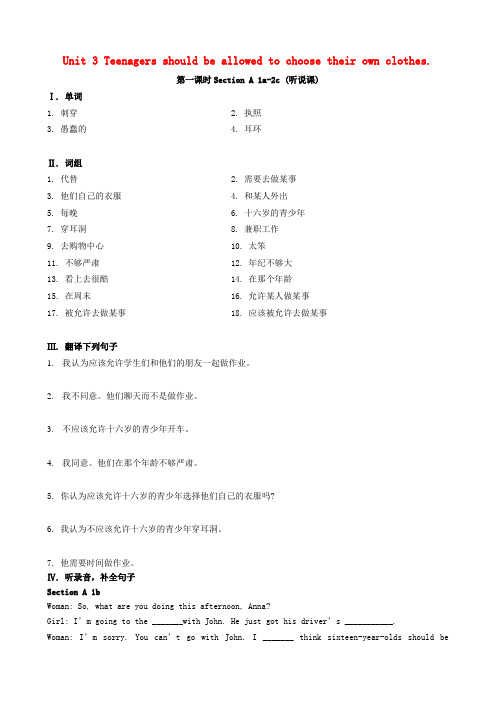
Unit 3 Teenagers should be allowed to choose their own clothes.第一课时Section A 1a-2c (听说课)Ⅰ. 单词1. 刺穿2. 执照3. 愚蠢的4. 耳环Ⅱ. 词组1. 代替2. 需要去做某事3. 他们自己的衣服4. 和某人外出5. 每晚6. 十六岁的青少年7. 穿耳洞 8. 兼职工作9. 去购物中心 10. 太笨11. 不够严肃 12. 年纪不够大13. 看上去很酷 14. 在那个年龄15. 在周末 16. 允许某人做某事17. 被允许去做某事 18. 应该被允许去做某事Ⅲ. 翻译下列句子1.我认为应该允许学生们和他们的朋友一起做作业。
2.我不同意。
他们聊天而不是做作业。
3.不应该允许十六岁的青少年开车。
4.我同意。
他们在那个年龄不够严肃。
5. 你认为应该允许十六岁的青少年选择他们自己的衣服吗?6. 我认为不应该允许十六岁的青少年穿耳洞。
7. 他需要时间做作业。
Ⅳ. 听录音,补全句子Section A 1bWoman: So, what are you doing this afternoon, Anna?Girl: I’m going to the _______with John. He just got his driver’s ___________.Woman: I’m sorry. You can’t go with John. I _______ think sixteen-year-olds should be____________to drive.Girl: But I have to go to the mall. Gaby’s getting her ears ___________ and I want to watch. Woman: I don’t think sixteen-year-olds should be allowed __________ their ears pierced. They might be sorry later.Girl: I agree, but it’s fun _____________. Is it OK if we take the bus?Woman: Well, I guess so.Girl: Great! I want to buy a ________________ at the mall, too.Woman: ______________are you going to buy? Maybe I should go with you.Girl: Aw, Mom. I’m not a child. I think ______________ should be allowed to __________their own clothes.Woman: Well, I just want to be sure you get something nice.Section A 2a,2bMolly: Larry is working late again tonight, Kathy.Kathy: I know, Molly. I don’t think _____________________ should be all owed to work at night.Young people need ______________.Molly: I ____________ with you. Teenage boys never get __________.Kathy: Well, maybe. But Larry ___________work every night.Molly: Oh, I agree. He needs time __________ homework.Kathy: You know, M olly… he should really ______ his hair.Molly: Oh, I don’t know. Do you think it’s too long?Kathy: Yes, I do. It doesn’t look clean. And I think he should stop ________ that ______ earring. Molly: Oh, I disagree. I kind of like it. It _________ cool!Kathy: You know what worries me - Larry doesn’t seem ____________ many friends.Molly: Yeah, I know. I think he __________ work on weekends.Kathy: Oh I agree, Molly. He needs to spend time with ___________.Molly: Like you and me?Kathy: Maybe.Ⅴ. 被动语态专项练习Ⅰ. 将下列句子变为被动语态1. 一般现在时的被动语态 (am/is/are + v.过去分词)They often clean their classroom after school.Their classroom ______ often __________ by them after school.They produce silk in Suzhou.Silk _________ ________ in Suzhou.People use metal for making machines.Metal ________ _________ for making machines.2. 一般过去时的被动语态 (was/were + v.过去分词)Li Lei gave Tom a new pen last week.A new pen ________ ___________to Tom by Li Lei last week.Lucy sent me a New Year Card yesterday.A New Year Card ________ __________to me by Lucy yesterday.Did he break the window this morning?Did the window _______ ____________by him this morning.3. 情态动词的被动语态 (情态动词 + be + v.过去分词)She should hand in her composition now.Her composition _________ ______ __________ in now.We can finish the work in two days.The work __________ _________ __________ in two days.You needn’t do it now.It ________ __________ _________ by you now.4. 现在完成时的被动语态 (have/has + been + v.过去分词)I have learned English for about two years.English _________ ________ __________ for about two years.I have given this book to the library.This book _______ _________ __________ to the library.He has done his homework since two hours ago.His homework _______ __________ ________ since two hours ago.5. 一般将来时的被动语态 (will + be + v.过去分词)We will hold the sports meeting next month.The sports meeting _________ _______ ________ next month.We’ll put on an English play in our school.An English play ________ _______ _______ on in our school.The children will sing an English song.An English song ________ __________ ________ by the children.Ⅱ. Unit3 A部分单项选择( ) 1._____ a new library _____ in our school last year?A. Is; builtB. Was; builtC. Does; buildD. Did; build( ) 2. Cotton ____ in the southeast of China.A. is grownB. are grownC. growsD. grow( ) 3. So far, the moon ____ by man already.A. is visitedB. will be visitedC. has been visitedD. was visited( ) 4. A talk on Chinese history _____in the school hall next week.A. is givenB. has been givenC. will be givenD. gives( ) 5. How many trees ____this year?A. are plantedB. will plantC. have been plantedD. planted( ) 6. A lot of things ____ by people to save the little girl now.A. are doingB. are being doneC. has been doneD. will be done( ) 7. Neither of them ______ in China.A. is madeB. are madeC. were madeD. made( ) 8. Your shoes ____. You need a new pair.A. wear outB. worn outC. are worn outD. is worn( ) 9. The doctor _____ for yet.A. isn't sentB. hasn't been sentC. won't be sentD. wasn't sent( ) 10. --When ___ this kind of computers ______? --Last year.A. did; useB. was; usedC. is; usedD. are; used( ) 11. The Great Wall ____ all over the world.A. knowsB. knewC. is knownD. was known( ) 12. He says that Mr. Zhang _____ to the factory next week.A. is sentB. would sendC. was sentD. will be sent( ) 13. Mary ____ show me her new dictionary.A. has asked toB. was asked toC. is askedD. asks to( ) 14. A story _____ by Granny yesterday.A. was told usB. was told to usC. is told usD. told us( ) 15. The school bag ___ behind the chair.A. putsB. can be putC. can be puttedD. can put( ) 16. Older people ____ well.A. looks afterB. must be looked afterC. must look afterD. looked after( ) 17. Our teacher ______ carefully.A. should be listened toB. should be listenC. be listenedD. is listened( ) 18. The man is badly hurt. He _____ to the hospital.A. has sentB. has been sentC. sentD. has sent for。
Teenagers should be allowed to choose their own clothes
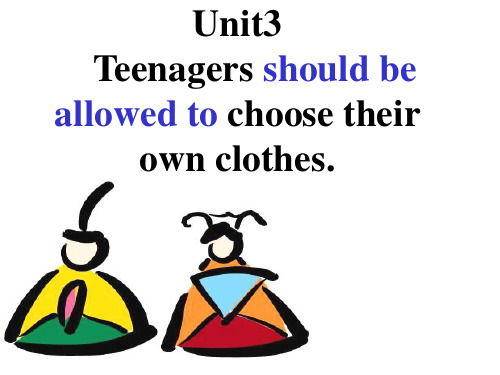
Teachers allow us to…… Teachers don’t allow us to ……
I want to play with my friends. But my father doesn’t allow.
Teenager Sixteen-year-old
He thinks parents should allow teenagers to play with their friends outside.
教学目标
语言知识目标:
理解并正确运用本单元的重点词汇,如: license, silly, study, present, experience, member, sleepy, reply, race, taught, important, care, succeed, point, etc. 熟练运用 “should (not) be allowed to do”谈论 应该被允许和不应该被允许做某事; 熟练运用 “be (not) allowed to do”谈论被允许 和不被允许做某事; 熟练运用 “I agree / disagree.”或“ I don’t agree.”表达自己的观点。
Parents should allow teenagers to go out with their friends.
Teenagers should be allowed to go out with their friends.
Parents should allow sixteenyear-olds to drive. Parents should allow fifteen-yearolds to choose their own clothes.
英语人教版九年级全册unit 3
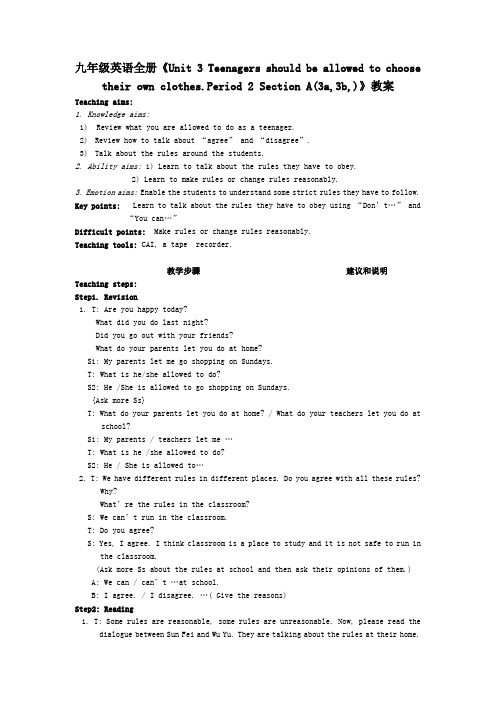
九年级英语全册《Unit 3 Teenagers should be allowed to choose their own clothes.Period 2 Section A(3a,3b,)》教案Teaching aims:1. Knowledge aims:1) Review what you are allowed to do as a teenager.2)Review how to talk about “agree” and “disagree”.3)Talk about the rules around the students.2. Ability aims: 1) Learn to talk about the rules they have to obey.2) Learn to make rules or change rules reasonably.3. Emotion aims:Enable the students to understand some strict rules they have to follow. Key points:Learn t o talk about the rules they have to obey using “Don’t…” and “You can…”Difficult points: Make rules or change rules reasonably.Teaching tools: CAI, a tape recorder.教学步骤建议和说明Teaching steps:Step1. Revision1. T: Are you happy today?What did you do last night?Did you go out with your friends?What do your parents let you do at home?S1: My parents let me go shopping on Sundays.T: What is he/she allowed to do?S2: He /She is allowed to go shopping on Sundays.{Ask more Ss}T: What do your parents let you do at home? / What do your teachers let you do at school?S1: My parents / teachers let me …T: What is he /she allowed to do?S2: He / She is allowed to…2. T: We have different rules in different places. Do you agree with all these rules?Why?What’re the rules in the classroom?S: We can’t run in the classroom.T: Do you agree?S: Yes, I agree. I think classroom is a place to study and it is not safe to run in the classroom.(Ask more Ss about the rules at school and then ask their opinions of them.) A: We can / can’t …at school.B: I agree. / I disagree. …( Give the reasons)Step2: Reading1. T: Some rules are reasonable, some rules are unreasonable. Now, please read thedialogue between Sun Fei and Wu Yu. They are talking about the rules at their home.After reading the dialogue, answer me some questions:1) Can Sun Fei go out on school nights?2) Can Sun Fei s tudy at a friend’s house?3) Who is allowed to go to the movies with friends on Friday?4) Does Sun Fei have to be at home by 10:00 p.m.?5) What isn’t Wu Yu allowed to do?2. Write their rules in the chart using “Don’t” and “You can”. (3a)Sun FeiWu YuDon’t go out on school nights.Don’t go out on school nights.You can study at a friend’s house.Step 3. PracticeRole play(3b)Cover the conversation in 3a and practice. Use the information in the chart.A: What rules do you have at home?B: Well, I’m not allowed to go out on school nights. How about you?A: I’m not allowed to go out on school nights, either. But I can study at a friend’s house.Step4. DiscussionDo you agree with the rules at their home? Why? Discuss in groups and then makea report.Report: At Sun Fei’s / Wu Yu’s home, she can / can’t… I agree / disagree. I think…Step5. Group work1.Do you like the rules at your home? What rules do you have at your home? (Asksome Ss to talk about their rules at home)The rules in the chart below are my friend’s rules at home.Talk to other students in the class and find three people who have to follow these rules in the chart.Find someone who…NameNameNamehas to stay at home on school nightsis allowed to stay up until 11:00 pmhas to get up early on weekendsis allowed to watch TV every nighthas to clean up his or her room every morning2.Do you like the rules in the chart? Do you want to make the rules by yourself?Work in groups and make rules that you like. You should give your reasons when you make the rules.You canDon’tAfter discussing, let some of them show their rules. Ask the reasons.Step5. Homework1. If you are the headmaster of the school or the chairman of the students union,make the rules.2. Write a report of your rules.In my school, / In my union, students can… Because I think…Bb design。
九年级英语第三单元知识点完整版
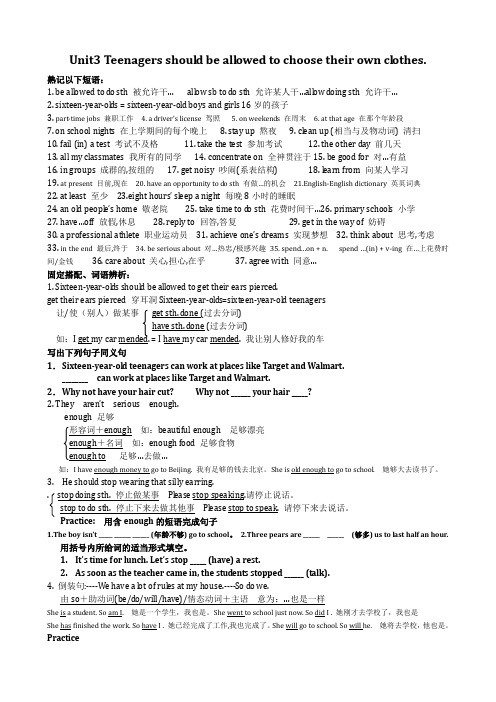
Unit3 Teenagers should be allowed to choose their own clothes.熟记以下短语:1. be all owed to d o sth 被允许干… allow sb to do sth 允许某人干…all ow doing sth 允许干…2. sixteen-year-olds = sixteen-year-ol d boys and girls 16岁的孩子3. part-time jobs 兼职工作4. a driver’s license驾照5. on weekends 在周末6. at that age 在那个年龄段7. on school nights 在上学期间的每个晚上8. stay up 熬夜9. clean up (相当与及物动词) 清扫10. fail (in) a test 考试不及格11. take the test 参加考试12. the other day 前几天13. all my classmates 我所有的同学14. concentrate on 全神贯注于15. be good for 对…有益16. in groups 成群的,按组的17. get noisy 吵闹(系表结构) 18. learn from 向某人学习19. at present 目前,现在20. have an opportunity to do sth 有做…的机会21.English-English dictionary 英英词典22. at l east 至少23.eight hours’ sl eep a night 每晚8小时的睡眠24. an ol d peopl e’s home 敬老院25. take time to do sth 花费时间干…26. primary schools 小学27. have…off 放假,休息28. reply to 回答,答复29. get in the way of 妨碍30. a professional athlete 职业运动员31. achieve one’s dreams 实现梦想32. think about 思考,考虑33. in the end 最后,终于34. be serious about 对…热忠/极感兴趣35. spend…on + n. spend …(in) + v-ing 在…上花费时间/金钱36. care about 关心,担心,在乎37. agree with 同意…固定搭配、词语辨析:1. Sixteen-year-olds shoul d be all owed to get their ears pierced.get their ears pierced 穿耳洞Sixteen-year-ol ds=sixteen-year-ol d teenagers让/使(别人)做某事get sth. d one (过去分词)have sth. done (过去分词)如:I get my car mended. = I have my car mended. 我让别人修好我的车写出下列句子同义句1.Sixteen-year-ol d teenagers can work at places like Target and Walmart.________ can work at places like Target and Walmart.2.Why not have your hair cut? Why not ______ your hair _____?2. They aren’t serious enough.enough 足够如:beautiful enough足够漂亮enough food 足够食物…去做…如:I have enough money to go to Beijing. 我有足够的钱去北京。
- 1、下载文档前请自行甄别文档内容的完整性,平台不提供额外的编辑、内容补充、找答案等附加服务。
- 2、"仅部分预览"的文档,不可在线预览部分如存在完整性等问题,可反馈申请退款(可完整预览的文档不适用该条件!)。
- 3、如文档侵犯您的权益,请联系客服反馈,我们会尽快为您处理(人工客服工作时间:9:00-18:30)。
Unit 3 Teenagers should be allowed to choose their own clothes.听说课 Section B 1a—2cTeaching goals:Talk about some school rules. Teach the students to obey the rules and understand each other. After leaning, students can talk about their own ideas and be willing to be good students .Teaching Procedures一、Preview:(预习导学)Translate the following phrases:上课迟到_____________________参加考试__________________ 通过考试____________考试不及格 _________________ 对某人严格要求_________________(设计意图:学生独立完成翻译练习,检验学生课前的预习情况。
为新课学习奠定基础,扫清学习障碍。
)二、RevisionShow some photos of my daughter’s activities at home, say something about her . Introduce some family rules that she must obey at home.For example: She has to study on school nights. She is allowed to watch TV after finishing homework on weekends.Then get the students to say some rules in their homes , using “have to ” , “be allowed to ”or.“ be not allowed to ”.(设计意图:用女儿的照片,并介绍她的一些家规,提高学习兴趣,引发他们想表述自己家规的共鸣。
创设人人都想开口说英语,积极用英语思考的良好氛围。
)三、Leading inShow some pictures about school activities on the screen.Ask some students “How often do you do … ? ”Guide them to answer the questions using always / usually / often / sometimes/ never .And show the chart. Make conversations with “Do you ever …” with your partner.For example: A: Do you ever get to school late?B: Yes, I sometimes get to class late. / No, I never get to class late.Then deal with 1a. Listen and circle the things that you hear.设计意图:(通过学生的口头训练,启发学生的思维,并为本节课的教学作好铺垫。
利用多媒体课件中的图示法使学生能更清楚地认识到这些频率副词的区别和用法。
)四、Listening for the general idea .(2a)Play the tape and get students to circle the things in 1a五、Listening for the specific ideas (2b)①Listen again and get them to match the two columns on the screen.Help the students understand the task and make sure they can master the meaning of the phrases on the right. Then play the tape again Give a pause after the crucial sentences to help them get the information they need easily. Ask five students to read the whole sentences to check the answers.②Play the tape for another time and get them to fill in the blanks with the phrases according to the listening material.Dad: _______ ______ _______, Peter?Peter: I think I’m going to _____ a math test, Dad.Dad: You are? Why?Peter: Well, I _______ the bus and I had to _____ ____ ______.Dad: So?Peter: I am not _________to get to class late, and there was a big test today.Dad: And you weren’t allowed to _____ ____ _____?Peter: That’s right. But I know I could ______ _____ ______.Dad: Well, Peter, the school has to have _______, you know.Peter : I know. But I should be allowed to take the test later. It’s not ______.Dad: I agree. Maybe you could _____ _____ the teacher after school.Peter: Yeah. Maybe if I explain what happened, she’ll understand.③Listen and repeat after the tape(设计意图:采取由易到难,循序渐进的方法来训练学生的听力技能,而后通过学生跟听录音的方式促进学生养成良好的朗读习惯,纠正学生的语音和语调。
使学生在今后的学习当中更能适应纯正的英语。
)六、Post-listening activities1.Role play the conversation. One plays as Dad, the other is Peter.2.Groupwork 2c Discuss these statements.Ask the students to read the sample conversation on the screen .Get them to form groups of four and then make similar conversations .3. Discussion.Discuss these statements.①. Students need strict school rules.②. Parents should not be too strict with usGive the students a sample dialog:A: Do you think students need strict school rules?B: Yes. I do. Because they are too young. They need strict rules./ No, I don’t. Because we would feel uncomfortable.A: I agree with you./ I disagree with you.B: Do you think parents…?A: …At last, tell the students to try to understand each other.(设计意图:通过小组活动,培养学生的合作精神和创新能力,巩固学生在本节课中学过的知识,同时也是为了增强学生的学习兴趣,浓厚课堂氛围。
任务设计难度逐渐增加,循序渐进,使学生把所学知识真正运用到实际交际中去。
)Inquiry into knowledge by translation: 翻译探究1.Do you ever worry that you’ll fail a test?在本句中____ 表示考试“不及格”或“不通过”; 相当于not_____, 也可构成 fail in 结构.鲍勃总是考试不及格。
Bob always _________________________.-注意:fail 后也可跟不定式,fail to do sth. 意为“未能做某事”。
我没能赶上早班车。
I failed ___________ (catch) the early bus.2.Strict 是____词,意为“__________”; be strict with sb. 意为“对某人要求严格”,“对某事要求严格”则用 be strict ____ sth.我们必须在学习上严格要求自己。
We must be ______ _______ ourselves ______ study.当堂检测 :Ⅰ.翻译句子1.I’m sorry I have _____ _____ _______ _______.(英语考试不及格)2.I’m sure I _______ _______ (能通过)the math test.3.Are you going to _______ ______ _____ _______(参加数学考试)?4.When did you ______ ______ (读完)this book ?5.Don’t _______ ________ (担心)him. He is not a child.Ⅱ.用括号内所给词的适当形式填空:1.We _________ (allow) to go to the movies on Friday nights.2.Books can_____________ (not take) out of the reading-room.3.All the work must ___________ (finish) before Wednesday.4.The boy can ________ (take) good care of in this hospital.5.The cat must _________ (kill) by somebody .教学反思:在设计任务型教学活动时以学生的真实生活和兴趣为焦点话题,学生易理解掌握;通过活动让学生习得英语语言知识、发展学生的语言技能;口语练习时尽量创造机会,促使学生主动获取、处理和使用信息,提高用英语解决实际问题的能力。
